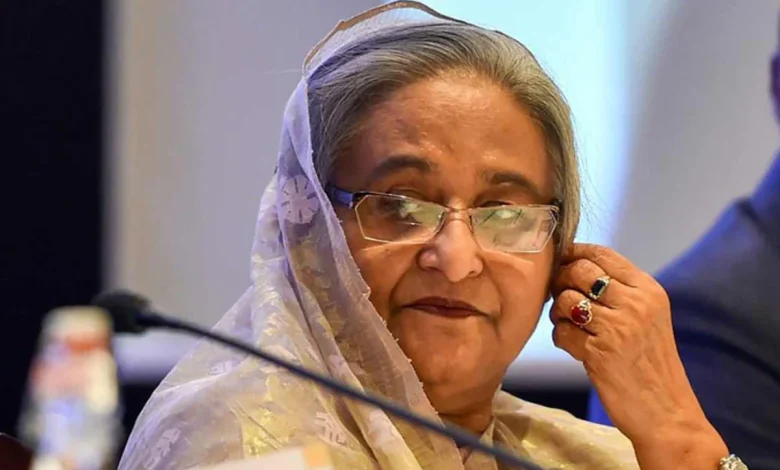Sheikh Hasina Gets Death Penalty In Bangladesh For “Crimes Against Humanity”

Bangladesh’s International Crimes Tribunal has sentenced former Bangladesh Prime Minister Sheikh Hasina to death in a case over alleged crimes against humanity committed. The court found Hasina guilty on three counts, concluding a months-long trial that found her guilty of ordering a deadly crackdown on a student-led uprising last year that led to the fall of her Awami League government.
The three-member tribunal, headed by Justice Mohd Golam Mortuza Majumder, also pronounced its judgement against Hasina’s two aides, former Home Minister Asaduzzaman Khan Kamal and former police chief Chowdhury Abdullah Al-Mamun, over the same charges.
The court said the three accused acted in connivance with each other to commit atrocities in order to kill protesters throughout the country. However, it pardoned the former police chief, who “sought an apology from the tribunal and the people of the country”.
Hasina and Kamal have been declared fugitives and tried in absentia, while Mamun initially faced trial in person before turning approver.
What Court Said
The court noted that the Hasina government did not pay heed to students’ demands, and instead of listening to the students, the then prime minister undermined the movement and made derogatory remarks pointing towards the students and terming them ‘Razakars’, a derogatory term used in Bangladesh.
In the aftermath of the derogatory remarks, students, including females, burst into a rage, the court noted, adding that Sheikh Hasina then ordered the “elimination of protesting students”.
The judges noted that the prosecution’s witnesses proved that the attack on Dhaka University students was by Awami League wings, including the Chhatra League and Yuva League.
“Sheikh Hasina ordered law enforcement agencies to use drones to locate congregating protesters and helicopters and lethal weapons to kill them,” the court said.
It added that former Home Minister Asaduzzaman Khan Kamal and former police chief Chowdhury Abdullah Al-Mamun committed crimes against humanity by their abetment in the use of drones and lethal weapons and helicopters by abetment and failure to prevent atrocities and are liable to be punished.
However, Abdullah Al-Mamun was given a pardon for making full disclosure related to the crime, and he admitted his involvement.
Convicting Hasina and Kamal, the court said their abscondence was suggestive of their guilt.
Hasina was “found guilty on three counts”, including incitement, ordering to kill, and inaction to prevent the atrocities, Judge Golam Mortuza Mozumder read to the packed court in Dhaka.
“We have decided to inflict her with only one sentence — that is, the sentence of death.”
Charges Against Hasina
Hasina, Kamal and Mamun faced five charges, including murder, attempted murder, torture and other inhumane acts. A key charge accused Hasina of ordering the “extermination” of protesters. She was also accused of making inflammatory remarks and directing the use of deadly weapons against students behind a mass uprising that forced her out of office in August 2024. A UN rights office report estimates that up to 1,400 people were killed between July 15 and August 15 during the “July Uprising” as her government ordered a sweeping security crackdown.
Hasina, 78, is currently living in exile in India, after defying the tribunal’s orders to face trial for ordering a deadly crackdown on a student-led uprising on August 5, 2024.
Chief Prosecutor Mohammad Tajul Islam has described Hasina as the “mastermind and principal architect” of the alleged atrocities during the protests. Her supporters, however, maintain the charges are politically motivated.
Hasina’s Extradition
Hasina fled Bangladesh on August 4, 2024, amid intensifying unrest and has since been residing in India. Kamal is also believed to have taken refuge in India. The interim government led by Muhammad Yunus has sought Hasina’s extradition, but India has yet to respond.
Unrest In Bangladesh
Security has been heightened nationwide ahead of the verdict. Dhaka Metropolitan Police Commissioner Sheikh Md Sajjat Ali on Sunday evening issued shoot-at-sight orders against anyone involved in arson, explosions or attempts to harm police and civilians.
The now-disbanded Awami League had called a two-day shutdown ahead of the judgement. Army troops, Border Guard Bangladesh personnel and riot police have been deployed around the ICT-BD complex, with streets in the capital largely deserted amid fears of violence.





